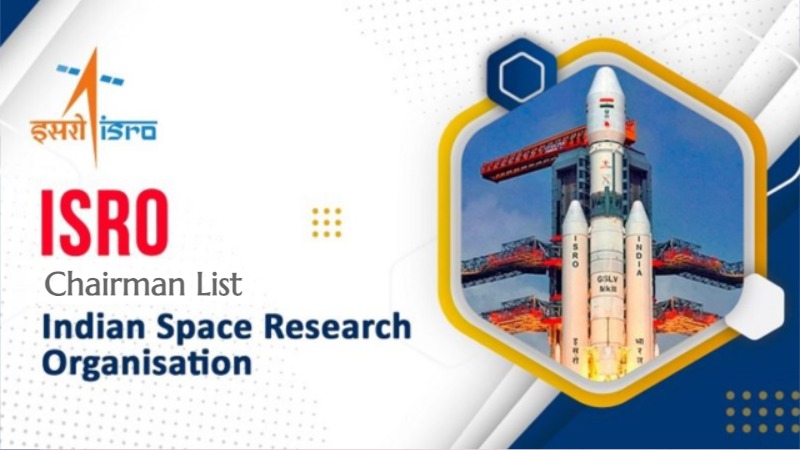
The Indian Space Research Organisation (ISRO) is the space agency of the Government of India, responsible for the planning and execution of space research and exploration activities. ISRO was established on 15 August 1969, ISRO has made significant advancements in space technology and exploration over the years. You can check the ISRO Chairman List till date with number, name, lifespan, term length, term start and end date and also the planned and completed missions of ISRO. The current ISRO chairman is S. Somnath and his feat includes the successful launch & accomplishment of the Chandrayaan-3 mission to explore the Moon’s south pole.
ISRO has achieved numerous milestones, including launching satellites for communication, remote sensing, navigation, and scientific research. Along with Chandrayaan 3 mission, the other most notable achievement of ISRO was the Mars Orbiter Mission (Mangalyaan), which made India the first Asian nation to reach Martian orbit and the fourth space agency in the world to do so. ISRO has also conducted successful lunar missions, such as Chandrayaan-1, Chandrayaan-2 and recently successful Chandrayaan-3 mission to become 1st country in the world to softly land on south pole of Moon.
ISRO’s continuous efforts and achievements have not only enhanced India’s capabilities in space technology but also contributed to global advancements in the field.
ISRO Chairman List
| Number | Name (Lifespan) | Term Start Date-Term End Date (Term Length) |
|---|---|---|
| 01. | Vikram Sarabhai (1919-1971) | 1963-1971 (8 Years) |
| 02. | M. G. K. Menon (1928-2016) | January 1972-September 1972 (9 Months) |
| 03. | Satish Dhawan (1920-2002) | 1973-1984 (12 Years) |
| 04. | U. R. Rao (1932-2017) | 1984-1994 (10 Years) |
| 05. | K. Kasturirangan (1940- ) | 1994-27 August 2003 (9 Years) |
| 06. | G. Madhavan Nair (1943- ) | 1 September 2003-29 October 2009 (6 Years, 58 Days) |
| 07. | K. Radhakrishnan (1949- ) | 30 October 2009-31 December 2014 (5 years, 62 Days) |
| 08. | Shailesh Nayak (1953- ) | 1 January 2015-12 January 2015 (11 Days) |
| 09. | A. S. Kiran Kumar (1952- ) | 14 January 2015-14 January 2008 (3 Years, 0 Days) |
| 10. | K. Sivan (1957- ) | 15 January 2018-15 January 2022 (4 Years, 0 Days) |
| 11. | S. Somanath (1963- ) | 15 January 2022-Incumbent (1 Years, 220 Days) |
About Indian Space Research Organization (ISRO)
Here we are providing more information about ISRO (Indian Space Research Organisation):-
- Establishment and Mission: ISRO was founded on August 15, 1969, with the primary objective of advancing space technology and using it for various national tasks such as communication, Earth observation, and scientific research.
- Space Research and Exploration: ISRO conducts research and development in various fields of space technology, including satellite communication, Earth observation, navigation, planetary exploration, and space science. The organization has achieved significant milestones in these areas.
- Satellite Launch Vehicles: ISRO has developed several launch vehicles, including the Polar Satellite Launch Vehicle (PSLV) and the Geosynchronous Satellite Launch Vehicle (GSLV). These launch vehicles are used to place satellites into different orbits for various purposes.
- Mars Orbiter Mission (Mangalyaan): ISRO’s Mars Orbiter Mission, launched in November 2013, successfully reached Mars’ orbit in September 2014. India became the first Asian country to achieve this feat and the fourth space agency in the world to do so.
- Chandrayaan Missions: ISRO launched its Chandrayaan missions to explore the Moon. Chandrayaan-1, launched in 2008, made significant discoveries, including the presence of water molecules on the lunar surface. Chandrayaan-2, launched in 2019, aimed to further explore the Moon’s south pole region. Chandrayaan 3 launched in 2023, has performed soft landing on the moon on 23 August 2023 making India the first country to land on the south pole of the moon and fourth country (overall) to softly land on moon’s surface.
- Navigation System (NavIC): ISRO developed the Indian Regional Navigation Satellite System (IRNSS), known as NavIC. It provides accurate position information services to users in India and the surrounding region, similar to the Global Positioning System (GPS).
- Earth Observation Satellites: ISRO has launched a series of satellites for Earth observation, remote sensing, and environmental monitoring. These satellites play a crucial role in applications such as agriculture, disaster management, urban planning, and more.
- International Collaboration: ISRO collaborates with various international space agencies and organizations on joint missions, research projects, and technology development.
- Commercial Activities: ISRO’s commercial arm, Antrix Corporation, handles the marketing and sale of satellite launches, transponder leasing, and remote sensing data to international clients.
- Future Endeavors: ISRO has ambitious plans for future missions, including the Gaganyaan mission to send Indian astronauts to space and the Aditya-L1 mission to study the Sun. The organization continues to work on improving its space technology and capabilities.
ISRO’s Missions List (Planned/Completed)
ISRO engages in educational and outreach activities to promote scientific and space awareness among students and the general public. This includes conducting workshops, exhibitions, and educational programs. Check List of planned as well as completed ISRO Missions through the link – https://en.wikipedia.org/wiki/List_of_ISRO_missions.
The chairman of the Indian Space Research Organisation is the statutory head of the Indian Space Research Organisation (ISRO). The officeholder is a secretary to the Government of India and an executive of the Department of Space (DOS) which directly reports to the prime minister of India.










